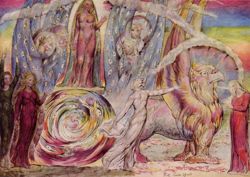Beatrice was a woman who lived in Florence in the late 13th Century, who is famous for her prominent role in the works of the poet Dante.
As a young woman, Beatrice was the object of Dante's affections. They did not marry, and it is not certain whether they even knew each other very well, but Dante adopted her as his muse and addressed the Vita Nuova, his early collection of love poems to her. The collection ends with a promise to immortalise Beatrice in a greater work, which is usually seen as referring to the Divine Comedy.
Beatrice died quite young, and it was after her death that Dante wrote his Divine Comedy, giving her a major role. In the work, it is through Beatrice's intercession that Dante is taken on his supernatural journey, and she acts as the poet's guide through Heaven in the Paradiso. Many commentators see the character of Beatrice as symbolising divinely-inspired wisdom, as a counterpart to Virgil, who symbolises earthly reason.
However, Beatrice's role is not purely symbolic: at times, she interacts with Dante simply as herself. The most notable of these is the episode in the Earthly Paradise where Dante is first reunited with her (Purgatorio, canto XXX). Beatrice arrives amid a highly symbolic pageant, but speaks to Dante plainly, as one person to another, rebuking him for not being faithful to her memory.
| ||||||||||||||
